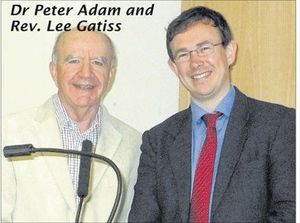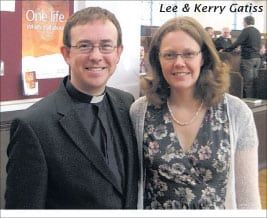Church Society
The Church Society met this May in sunny Hertfordshire for its annual conference. The conference aim was to reflect on the danger of evangelical apostasy.
Iain Murray of the Banner of Truth Trust opened with a talk on the characteristics and causes of apostasy. Apostasy exists in the church because of unbelief, abused consciences, forgetting past lessons, and absence of zeal for the truth. As people reject God’s Word the Lord gives them over to believe lies (Romans 1; 2 Thessalonians 2). However, ultimately Satan is the real apostate; and we wrestle not against flesh and blood but with the ‘spiritual forces of evil in the heavenly realms’ (Ephesians 6).
Penal substitution
Iain outlined our duties in times of apostasy. We need to strengthen our awareness of the danger and of the urgency of progress towards maturity and holiness in the Christian life.
Andrew Sach of St Helen’s, Bishopsgate, and co-author of Pierced for our transgressions spoke on the doctrine of penal substitution. He explained that ‘evangelicals’ have raised dissenting voices over this doctrine in recent years. In 2003 Steve Chalke described Christ’s punishment for our sins as ‘cosmic child abuse’.
The Evangelical Alliance failed to discipline Chalke and this heretical view has become an option for many ‘evangelicals’. Andrew explained from Romans 3:10-12 that Jesus had to be punished for our sins, because we have all sinned and fallen short of God’s glory and are therefore under God’s wrath. Andrew expounded Isaiah 53 to show that the only solution is in Christ as our penal substitute. He discussed how some ‘evangelicals’ try to get around these verses and how we need to respond with carefully thought-out answers.
Nick Tucker, research fellow at Oak Hill College, discussed the influence of Edward Irving on Christology in the 19th century and beyond. The difference between orthodoxy and heresy often focuses on the person of Christ. He demonstrated this from the life and teaching of Irving. Although at the time Irving was treated as heretical, his teaching remains influential amongst some Anglo-Catholics, theological liberals and Charismatics. Heretical views can quickly take root and harm many people.
True revival
The conference ended with Iain Murray’s exposition of Acts 4 on the marks of true revival. He characterised revival as a period when the Christian faith becomes the concern of many people. It is an awakening – an outpouring of God’s Spirit on whole communities. Revivals are not organised, nor can they be predicted.
The Spirit is so given to preachers that they lift up their voices to preach with new authority. People forget personalities, as they hear the Spirit of God speaking to them through the preacher. The Spirit also makes the gospel messenger conform to the message. He becomes humble, tender-hearted and bold, conveying something of Christ. In between these various talks Jonathan Fletcher gave three expositions from Ezekiel 34-37.
The conference was a further good opportunity for Anglican conservative evangelicals to be encouraged in the faith, in order to carry on the fight to keep the Church of England faithful to the Bible and its articles of faith. (CDs from www.churchsociety.org)
David Meager












